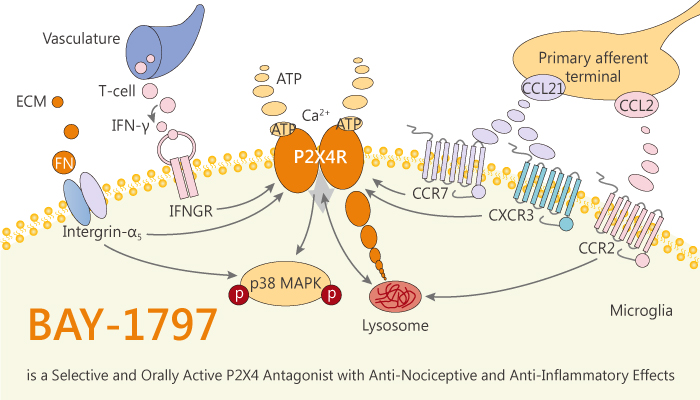Adenosine triphosphate (ATP) is an important neurotransmitter implicated in various physiological and pathophysiological roles. It acts through different subtypes of purinergic receptors. There are seven members in the P2X family so far, comprising P2X1-7. The P2X4 receptor is a ligand-gated ion channel. A variety of cell types expresses it, largely those known to be involved in inflammatory and immune processes. Specifically, it includes monocytes, macrophages, mast cells, and microglia. Activation of P2X4 by extracellular ATP releases pro-inflammatory cytokines and prostaglandins such as PGE2. P2X4 is an attractive therapeutic target in multiple pathologies, especially in chronic inflammation and neuropathic pain. In this study, BAY-1797 is a potent, orally active, and selective P2X4 antagonist, with an IC50 of 211 nM against human P2X4. BAY-1797 displays no or very weak activity on the other P2X ion channels. In addition, It shows anti-nociceptive and anti-inflammatory effects.

BAY-1797 is an orally active, and selective P2X4 antagonist with anti-nociceptive and anti-inflammatory effects.
BAY-1797 inhibits human, mouse, and rat P2X4 in 1321N1 cells with IC50s of 108 nM, 112 nM, and 233 nM, respectively. Meanwhile, it exerts no measurable activity on hERG and carbonic anhydrase II (both IC50>10 μM). Moreover, it also inhibits a panel of off-targets, including G-protein coupled receptors (GPCRs), ion channels, kinases, and transporters at 10 μM. It also reveals the inhibitory activity against the dopamine transporter (DAT, IC50 2.17 μM).
BAY-1797 shows a significant induction of PGE2 levels in the inflamed paw in the mouse Complete Freund’s Adjuvant (CFA) inflammatory pain model. BAY-1797 induces a significant reduction of the ipsilateral paw load 24 and 48 h after CFA injection. Therefore, BAY-1797 shows anti-inflammatory and anti-nociceptive effects in a mouse CFA inflammatory pain model. Furthermore, BAY-1797 treatment shows the AUCnorm, Vss, and t1/2 are 1.06 kg h/L, 3.67 l/kg and 2.64 hours, respectively
In summary, BAY-1797 is a potent and selective P2X4 inhibitor. It has anti-inflammatory and anti-nociceptive effects in mouse CFA inflammatory pain models.
Reference:
Werner S, et al. J Med Chem. 2019 Dec 26;62(24):11194-11217.